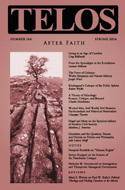Writing in the Washington Post, George Will discusses Joel Kotkin’s The New Class Conflict (recently published by Telos Press) and the reasons why today’s government serves the wealthy and powerful.
|
Nicholas W. Drummond’s “Immigration and the Therapeutic Managerial Government” appears in Telos 166 (Spring 2014). Read the full version online at the Telos Online website, or purchase a print copy of the issue in our store. Don’t forget: the Eighth Annual Telos Conference will be held this upcoming weekend, February 15–16, 2014, in New York City. Registration is now closed, but if you are still interested in attending the conference, please RSVP to deutscheshaus.rsvp@nyu.edu. Please note that some of the talks are limited to registered attendees only. Additional details about the conference, as well as the complete conference program, are available at the Telos-Paul Piccone Institute website. We look forward to seeing you this weekend! The Difficulty of Democracy: Diagnoses and Prognoses In spite of its advantages as an ideal form of government, democracy has proven to be remarkably difficult to establish and to maintain in reality. While it remained a rare exception for much of human history, its spread in the modern world has not had the character of a triumphant march but rather of a tortured path dominated by failed attempts, transformations into dictatorship, and degenerations into civil war. Even the most successful cases, Great Britain, France, and the United States, were marked by a concurrence of the rise of democratic institutions with an imperialist expansion that created a de facto hierarchy of citizens and non-citizens familiar also in ancient Athens. The purpose of the Eighth Annual Telos conference will be to analyze the key characteristics of democracy in order to determine, first, the precise advantages and disadvantages of this form of government in comparison to alternatives, second, the reasons for its rarity and volatility, and, third, the factors that are essential for its stability. We welcome paper submissions that address issues such as classical and modern theories of democracy, case studies of successful or failed democracies around the world, antinomies and conflicts within established democracies, revolutionary movements as progenitors of democracy, degeneration of democracies into other forms of government, the importance of culture and representation for founding and maintaining democracy, and the economic requirements and consequences of democracy. Please send an abstract and short c.v. to dtpan@uci.edu by August 31, 2013. |
||||
|
Telos Press Publishing · PO Box 811 · Candor, NY 13743 · Phone: 212-228-6479 Privacy Policy · Data Protection Copyright © 2025 Telos Press Publishing · All Rights Reserved |
||||

 Multiculturalism as state policy in the Western World has functioned without serious complications because an unequivocal division existed between the oppressive culture group and the culture groups requiring protection. Recent evidence suggests this distinction may be fading and the consequences are likely to be significant. Managerial governments traditionally accommodating towards diverse cultures are beginning to critically evaluate immigrant communities feared to be afflicted with objectionable pathologies like the tendency of some Islamic groups to promote gender inequality, homophobia, and Sharia law.
Multiculturalism as state policy in the Western World has functioned without serious complications because an unequivocal division existed between the oppressive culture group and the culture groups requiring protection. Recent evidence suggests this distinction may be fading and the consequences are likely to be significant. Managerial governments traditionally accommodating towards diverse cultures are beginning to critically evaluate immigrant communities feared to be afflicted with objectionable pathologies like the tendency of some Islamic groups to promote gender inequality, homophobia, and Sharia law.

